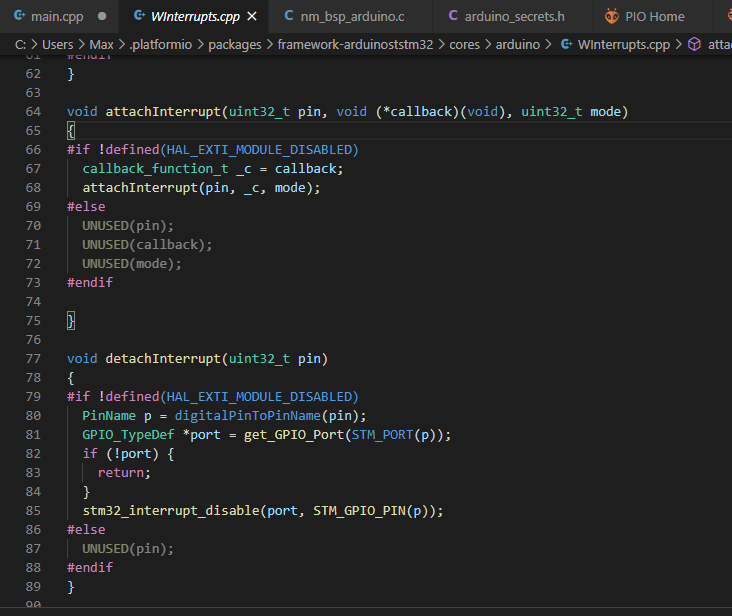Yeah the problem is that the caller can’t find the reference to attachInterrupt because the caller is in a .c file and the implementation is in a .cpp file but is not exposed as extern "C", so due to C++ name-mangling, this doesn’t work.
attachInterrupt is definitely there in WInterrupts.cpp.
Simply add the needed glue code in the main CPP file of project. That’s why the function is weak anyways.
extern "C" void attachInterruptMultiArch(uint32_t pin, void *chip_isr, uint32_t mode)
{
void (*_c)(void) = (void(*)(void))(chip_isr);
attachInterrupt(pin, _c, mode);
}
extern "C" void detachInterruptMultiArch(uint32_t pin)
{
detachInterrupt(pin);
}
that plus a platformio.ini of
[env:nucleo_f429zi]
platform = ststm32
board = nucleo_f429zi
framework = arduino
lib_deps = arduino-libraries/WiFi101@^0.16.1
(remember, you should always declare all needed libraries in lib_deps) and the example “WiFi Web Client” in full
#include <Arduino.h>
#include <SPI.h>
#include <WiFi101.h>
#include "arduino_secrets.h"
///////please enter your sensitive data in the Secret tab/arduino_secrets.h
char ssid[] = SECRET_SSID; // your network SSID (name)
char pass[] = SECRET_PASS; // your network password (use for WPA, or use as key for WEP)
int keyIndex = 0; // your network key Index number (needed only for WEP)
int status = WL_IDLE_STATUS;
// if you don't want to use DNS (and reduce your sketch size)
// use the numeric IP instead of the name for the server:
//IPAddress server(74,125,232,128); // numeric IP for Google (no DNS)
char server[] = "www.google.com"; // name address for Google (using DNS)
// Initialize the Ethernet client library
// with the IP address and port of the server
// that you want to connect to (port 80 is default for HTTP):
WiFiClient client;
void printWiFiStatus();
extern "C" void attachInterruptMultiArch(uint32_t pin, void *chip_isr, uint32_t mode)
{
void (*_c)(void) = (void(*)(void))(chip_isr);
attachInterrupt(pin, _c, mode);
}
extern "C" void detachInterruptMultiArch(uint32_t pin)
{
detachInterrupt(pin);
}
void setup() {
//Initialize serial and wait for port to open:
Serial.begin(9600);
while (!Serial) {
; // wait for serial port to connect. Needed for native USB port only
}
// check for the presence of the shield:
if (WiFi.status() == WL_NO_SHIELD) {
Serial.println("WiFi shield not present");
// don't continue:
while (true);
}
// attempt to connect to WiFi network:
while (status != WL_CONNECTED) {
Serial.print("Attempting to connect to SSID: ");
Serial.println(ssid);
// Connect to WPA/WPA2 network. Change this line if using open or WEP network:
status = WiFi.begin(ssid, pass);
// wait 10 seconds for connection:
delay(10000);
}
Serial.println("Connected to wifi");
printWiFiStatus();
Serial.println("\nStarting connection to server...");
// if you get a connection, report back via serial:
if (client.connect(server, 80)) {
Serial.println("connected to server");
// Make a HTTP request:
client.println("GET /search?q=arduino HTTP/1.1");
client.println("Host: www.google.com");
client.println("Connection: close");
client.println();
}
}
void loop() {
// if there are incoming bytes available
// from the server, read them and print them:
while (client.available()) {
char c = client.read();
Serial.write(c);
}
// if the server's disconnected, stop the client:
if (!client.connected()) {
Serial.println();
Serial.println("disconnecting from server.");
client.stop();
// do nothing forevermore:
while (true);
}
}
void printWiFiStatus() {
// print the SSID of the network you're attached to:
Serial.print("SSID: ");
Serial.println(WiFi.SSID());
// print your WiFi shield's IP address:
IPAddress ip = WiFi.localIP();
Serial.print("IP Address: ");
Serial.println(ip);
// print the received signal strength:
long rssi = WiFi.RSSI();
Serial.print("signal strength (RSSI):");
Serial.print(rssi);
Serial.println(" dBm");
}
together with the src/arduino_secrets.h of the form
#ifndef ARDUINO_SECRETS_H
#define ARDUINO_SECRETS_H
#define SECRET_SSID "your wifi here"
#define SECRET_PASS "your password here"
#endif
does compile.
Compiling .pio\build\nucleo_f429zi\src\main.cpp.o
Linking .pio\build\nucleo_f429zi\firmware.elf
Building .pio\build\nucleo_f429zi\firmware.bin
Checking size .pio\build\nucleo_f429zi\firmware.elf
Advanced Memory Usage is available via "PlatformIO Home > Project Inspect"
RAM: [ ] 0.9% (used 2240 bytes from 262144 bytes)
Flash: [ ] 1.6% (used 32944 bytes from 2097152 bytes)
============================= [SUCCESS] Took 5.20 seconds =======================
